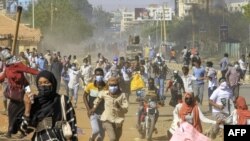Diplomats and military leaders stressed the need for the rapid formation of a new government at a launch for the second phase of talks late on Sunday.
"The goal is for the results of this conference to represent a wide base of Sudanese, to be comprehensive and express the views of stakeholders," politician Khalid Omer Yousif told a press conference on Monday.
One of those points, the policy for dismantling the administration of Omar al-Bashir after his overthrow in an uprising in 2019, is the first to be tackled in talks this week.
The process of dissolving Bashir-era institutions and retrieving funds was one source of tension between political leaders and the military in the run-up to the October 2021 coup.
Future talks will tackle other thorny issues left out of the framework accord: transitional justice, security sector reform, a peace deal signed in 2020, and tensions in Sudan's east.
Discussions to win support for the agreement from Minni Minawi and Jibril Ibrahim, two former rebel leaders who became senior officials after the coup, had not been successful but were ongoing, Yousif said.
The October 2021 coup ended a power-sharing agreement between the military and the Forces of Freedom and Change, a civilian coalition, signed after Bashir's ouster.
Since the military takeover, no new prime minister has been named, the economy has stagnated and internal conflicts in parts of the country have escalated.
Demonstrations against military rule and the framework deal have continued in recent weeks.
Several hundred protesters have been injured by security services, according to medics aligned with the protesters. Authorities say peaceful protests are allowed and casualties will be investigated.






![Sudan's Civil Groups to Finalize Deal With Military [3:12]](https://gdb.voanews.com/59ce4368-61e2-4fcb-a3bd-2aa959548674_w33_r1.jpg)